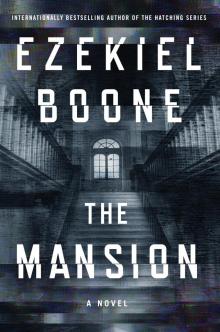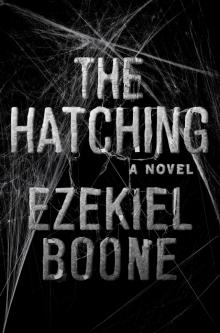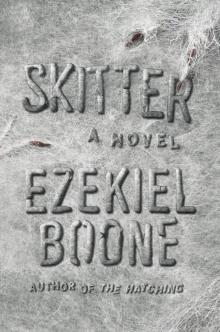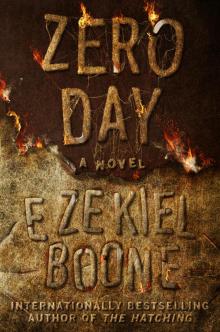- Home
- Ezekiel Boone
Zero Day Page 16
Zero Day Read online
Page 16
Shotgun had similarly decked himself out, although he’d managed to keep hold of his multitool the entire way. To Gordo’s surprise, he’d also brought along two of the metal nozzles they’d fashioned back in Shotgun’s workshop. Those nozzles and a few pieces of gear readily attainable at almost any hardware store could make a pretty kick-ass flamethrower.
As for Teddie, she’d been wearing an assortment of borrowed clothes and military gear with a pair of shoes that might have made sense for her back at CNN but weren’t of much use out here. She’d found sensible travel clothes, and Shotgun had convinced her that a pair of lightweight hiking boots that wouldn’t take any real break-in time were the way to go. She’d also opted for a hydration pack, and—thanks to the miracle of modern technology, which meant that her video stuff was all pretty compact—she was able to fit her camera and all her attendant gear in the bag as well as a change of clothes, some nutrition bars, and something called a Mooncup. She’d started to explain to Shotgun how the Mooncup worked, but as soon as she said the word menstruation, he threw his hands up in the air.
“I’m gay,” he said, “but I’m still a guy.” He walked to the back of the store and started looking closely at the dehydrated camping food while Teddie and Gordo laughed.
While they’d been in the store, there wasn’t any explicit talk about cutting and running, but there was a tacit understanding between Gordo and Shotgun. Even before they turned on their satellite phones and got texts from Fred and Amy, Gordo had known what their decision was going to be. Rodriguez had signaled his alliance with the breakaway faction of the military, but with what the ST11 was telling them?
Without the satellite phones, Gordo wasn’t sure what they would have done. But they did have the satellite phones, and Amy had given a clear and concise account of the coup and the choices facing them. While Gordo understood the drive behind the military men who had tried to seize control—when you see a spider, isn’t the impulse to smash it?—he and Shotgun were being given an opportunity to perhaps, maybe do something that could potentially save lives. Gordo and Shotgun had been friends for long enough that he knew it wasn’t a question of if they were going to try to split off from the Marines and get to Amy and Fred and Dr. Guyer; it was a matter of whether they were going to risk taking Teddie with them. He still wasn’t sure what they would have decided had it been up to the two of them, because Teddie had asked them point-blank if they were splitting, and when Shotgun hesitantly said yes, she told them she was coming with them.
“So let me just make sure I’ve got this one hundred percent,” she said. She kept her voice low. Not whispering, nothing to call attention to herself, but quiet enough that it wouldn’t carry. They were sitting by the pickup truck they’d driven from the NIH, but Kim Bock had left it parked at the far side of the lot, and the closest Marine was still thirty or forty feet away. It hadn’t occurred to Rodriguez—not yet—that his three civilians were a flight risk.
Teddie kept stuffing her gear into her bag. “Your little doohickey can tell us where the spiders are, and we can use that to tell the president where to attack instead of just willy-nilly bombing stuff.”
Shotgun glanced at the ST11. It was relatively small. Among other modifications, they’d also rigged up a battery pack, so it didn’t need an inverter or standard electricity anymore. It wasn’t an ideal setup, but they’d stuffed it into another backpack from the outdoor store and run a cable out so that they could keep the ST11 in the bag and plug it into the laptop. Not pretty, but functional.
“Not all the spiders, no,” Shotgun said. “Again, think about how you’ve said they move like they’re fake. Like they’re all following orders. That there’s not enough randomness for a bunch of spiders. Well, you put that together with the way the ST11—as we originally intended it—made the spiders sort of pacifists. I’m sure that Dr. Guyer—Melanie—will want to study it, and there’s more to it than this, but basically we think that you’re right: the spiders are essentially following orders. The basic idea of the ST11 was that we were going to use extremely low frequencies as a weapon, but instead it seems like we ended up blocking the spiders’ transmissions. The orders, so to speak. And what we did when we reworked this beast,” he said, elbowing the bag with the ST11, “was to figure out how to receive the transmissions instead of blocking them. Then we combined that with some proprietary software I developed for the government that taps into the GPS satellites. With the GPS system on board, and using what we know about longwave and shortwave and sky wave propagation—”
“Got to be honest,” Teddie said, “you sound a bit like a Bond villain right now.”
“—and sky wave propagation,” Shotgun continued, as if he hadn’t been interrupted, “I think I can pinpoint where the orders are coming from. So, yes, we can figure out where to attack. In theory.”
“In theory?”
Gordo put the satellite phone into his jacket pocket. “I mean, it seems to check out, but we thought we had something that would work to kill the spiders with the first version of the ST11, and it just sort of made them sleepy. So, you know, we think we’re right, but . . .”
“But?”
“But,” he said, “it wouldn’t be the worst thing in the world to give it a real-world test.”
“Okay,” Teddie said. “How do we do that?”
“Go to Atlantic City.” Gordo pulled his backpack closer. “We confirm that we’re not actually crazy, and then we bring this to Dr. Guyer, who has the ear of the president, and then the president figures out how to pinpoint the attacks and kills all the spiders.” He paused, considered, and then continued. “And then, honestly, once the day has been saved, we’re big old heroes. They’ll have a ceremony where we stand in front of a bunch of people and get medals like at the end of the first Star Wars movie.”
“You mean the first Star Wars movie, like, the old one, or episode one?”
Gordo couldn’t stop himself from glaring at Teddie. “The first Star Wars movie. The first Star Wars movie is always episode four, A New Hope.”
Teddie closed the flap of her backpack. “Whatever, nerd. Are you Chewbacca in this scenario here?”
“I’m literally just going to say the word ‘sigh,’ Teddie, and move on. The point is, we’re getting a ping out of Atlantic City. So we go there; the closer we get, the more we can narrow down the signal; and hopefully . . .”
“Hopefully, what?” Teddie said. “Hopefully we don’t get eaten? Because that sounds like a crappy plan.”
“Actually, pretty sure we’ve got that one figured out.” Shotgun brought his hand up to shade his eyes. Gordo turned to look where Shotgun was looking. Across the parking lot, a small cluster of Marines was huddled around the hood of an SUV staring at what Gordo thought was one of the military radios. “Once we’re in Atlantic City, I’m ninety percent sure I can keep us safe. We’ll have to make a stop along the way, but, yeah, we need to go to Atlantic City.”
From above them, out of the open window of the pickup truck, Gordo heard Kim’s voice.
“Atlantic City? You really need to actually go there? You’re telling me we can’t just bomb Atlantic City and be done with it?” Her head popped out of the window. She wiped at one of her eyes. “God, can’t take a nap around here without accidentally overhearing you all scheming away.”
“Kim—”
“Lance Corporal Bock.” She waited a beat, and then she laughed. “Just kidding. But you should have seen your face.” She propped both her arms on the windowsill and peered at him and then at Shotgun and Teddie before looking across the parking lot to where the other Marines were gathered.
Shotgun scooted away from the tire so he could see her. “How much did you hear?”
Kim considered him. “Enough.”
“And?”
She disappeared for a second and then opened the door and climbed out. “Do you guys know what the oath of enlistment is?” They all shook their heads. “You’ve heard it, and I’m going to get some of
it wrong, but it’s something like this: ‘I solemnly swear I will support and defend the Constitution of the United States against all enemies, foreign and domestic.’ ” She paused and shook her head. “I guess that probably includes insane alien spiders. So, yeah, I will support and defend the Constitution of the United States against all enemies, foreign and domestic and spiders, and there’s something else I forget, but then it goes: ‘I will obey the orders of the President of the United States and the orders of the officers appointed over me, according to regulations and the Uniform Code of Military Justice. So help me God.’ ” Gordo and Shotgun and Teddie stayed quiet, watching her.
Finally she shrugged. “Maybe I didn’t get all the words right, but that’s the gist of it. I don’t really know who’s wrong or who’s right, but when I swore that oath, I never really thought about the possibility that I’d have to choose between the president and my commanding officer. I’ve seen these suckers up close. We’re lucky as hell that we managed to get away from them. It was chaos. I mean, this was back when we still thought a quarantine zone would work.” She shrugged. “That sounds funny, doesn’t it? ‘Back when we still thought a quarantine zone would work.’ Like it was years ago. Ancient history. But we’re talking a couple of weeks, right? Anyway, this was on the fringes of Los Angeles . . . Well, more than that: way out of the city, on the highway. Or interstate. I’m not actually sure what the difference between a highway and an interstate is, and I guess it doesn’t matter. The thing that matters is that we had the road blocked and traffic was backed up for miles and miles and then, when the spiders started swarming, the military went to town to try to contain them. I’m talking jets screaming overhead and firing missiles, helicopters firing chain guns, us Marines up in our JLTVs with our .50-cals spitting out bullets to the tune of hundreds of rounds a minute. And the civilians? Even with all that, people were more scared of the spiders. They ran toward us while we were firing on them.
“I’ll tell you this: Those spiders? They’re a black swarm of living death, and if I happened to be magically in charge of the universe, I’d never come within a thousand miles of those suckers again. But I can tell you this, too: when we were at the NIH, we were just a few miles from my parents’ house. And we left because you made a very good point. We left the NIH and drove here because you convinced us that the Washington, DC, metro area was going to be next on the ticket for tactical strikes. We all know what that means. Tactical strikes. I doubt the fact that they were tactical strikes is much solace for the people living in Denver or Seattle or any of those other cities that are just piles of rubble leaking radioactive smoke. Living. Who lived.
“Let’s be honest. Our whole platoon got a gift when we got tasked with bringing you folks east. If not for that, we’d probably still be somewhere near Los Angeles or somewhere else that ate a nuke. As my grandmother liked to say, I didn’t fall off a turnip truck. I’m not dumb enough to think that the men and women in the armed forces out west were somehow left miraculously unscathed by those tactical strikes.”
She looked up at the sky for a moment, then back down at Gordo and Shotgun and Teddie. “And right now, near as I can tell, there are two choices: the president of the United States of America, who authorized those original nukes but who is now saying enough is enough, or a group of brass who’ve seized control of a big chunk of the military and want to keep slinging atom bombs. Do I know what the right decision is? Of course not. I’m a lance corporal and I’m only eighteen. I’ve got less than a year in the Corps. What I do know, however, is that if there’s a chance to save Washington, DC, from getting lit up—if there’s a path that might keep my parents alive, might save more lives—well, I have to take it.”
She bit her lip and then motioned generally across the parking lot. “I think the same could be said for a bunch of us. Not all of us. But there are a few I trust, and I think you’ll have better luck getting where you’re going with a little help. What do you say?”
Teddie looked at both Gordo and Shotgun wide-eyed, but Shotgun gave a nod. It was his call. Shotgun was better at engineering and math and, hell, almost everything, but Gordo was better at reading people. He thought about it. It worried him, the idea that she’d tell the other Marines. The more people who knew, the more likely it was to cause a problem. He wasn’t sure what Rodriguez would do if he got wind of their plan to go AWOL. Except, Gordo thought, it was only Kim and her platoon mates who were going AWOL. He and Shotgun and Teddie were civilians. Again, though, that was the problem: he didn’t think Rodriguez would see it that way. In Rodriguez’s eyes, they and the ST11 were “high-value assets,” and that meant, when it came down to it, if they tried to leave and Rodriguez didn’t want them to . . .
So was it worth the risk? He stared at Kim. He trusted her. She was a smart kid, and they’d been together for a while now. The stress and pressure had made days feel like months, and he believed her, that she would help them. And if he trusted Kim, he figured she knew her men well enough to know whom she could trust. Because, ultimately, Kim was right: with the chaos on the roadways and with all the potential for problems, they were better off if they had a few Marines accompanying them than if they were on their own.
“Okay,” he said.
She nodded. “You three get in the truck. And try to seem inconspicuous.”
“Now?”
“Now,” she said, already turning to walk across the parking lot. But then she stopped and looked back at Gordo. “I’m a Marine. Civilians like to talk about things,” she said, flashing him a white-toothed smile. “Marines like to get stuff done. Let’s saddle up, head to Atlantic City, and let’s figure out how to be heroes. And, oh,” she added, “if there is a medal ceremony like from Star Wars, I get to be Princess Leia.”
Central Park, New York, New York
Melanie watched Amy lift the dog down from the helicopter. Even though she knew it wasn’t necessary, Melanie was hunched over. It was a reflexive action. The Osprey was powering down, but the spinning blades made her nervous. The whole thing had made her nervous: donning a borrowed US Navy uniform, climbing onto two different helicopters with close to fifty other people, half of whom were just dressed in military uniforms, half of whom were actually in the military, as if they were supposed to be leaving the USS Elsie Downs in the middle of a coup that was occurring in the middle of an apocalypse. The worst part, actually, was the five or ten seconds when the Osprey rotated its wings to turn from a helicopter into a plane. She didn’t like that at all.
But they’d made it to Central Park. Billy Cannon, the secretary of defense, had told her during the flight that the White House—“I don’t know: White House in exile?”—was being cagey about the president’s location in New York City, so they had to land in Central Park and wait for a convoy of vehicles to bring them to Steph.
She was impressed by how calm Amy seemed about all of it. Fred nervously made jokes the whole time, but Amy took it all in stride. Even now, as Melanie watched, Amy led Claymore off to one side and unclipped his leash so that the dog could do his business in the bushes. The dog seemed to take his cue from his owner; as he bounced off into the undergrowth, he seemed completely at ease with what had just happened.
As Melanie watched Amy and the dog, she felt a hand on her shoulder. She turned to see Fred, who was preening for her.
“My god, do I look good in a uniform or what?” he said.
She had to laugh. There had been a few times when she’d wanted to tell him to bring it down a notch, but mostly he’d been exactly what she needed: a release valve. It was funny how different Fred seemed from his husband. While Shotgun was cerebral and circumspect, Fred was all glitz and charm. Shotgun, Melanie knew from the limited amount of time she had spent working with him, liked to engage directly on an intellectual level, but Fred needed an audience, and at the moment Melanie was happy to oblige. She watched him spin around in his uniform and then touch a finger to his backside and pretend it sizzled.
Special Ag
ent Riggs came up beside her and motioned to Amy and the dog. “You might want to keep them close. We’ve got a convoy on the way. Things are a bit hectic, and if I’m being honest, your friends,” he said, indicating Fred now, who had drifted off and was primping for Julie, “aren’t top priority. If they don’t stay close to you, they’re liable to get left behind.”
Melanie nodded and Riggs walked away, toward the potpourri of people milling around the two helicopters. She looked again at Amy, who had her satellite phone out and appeared to be talking to somebody: finally gotten in touch with her husband, Melanie figured. She’d sent a string of texts to Gordo, who’d responded, but they hadn’t actually talked. As soon as Melanie had a chance, though, she was going to borrow Amy’s sat phone and try to talk to Gordo and Shotgun herself. Amy had shown her a text the guys had sent that said they had figured out a “tracker,” but she wasn’t entirely sure what to make of it. However, it made her think to walk over and tell Amy to stay close. Before she could move, she got distracted by the sound of sirens. It took her a second to pinpoint the source: a line of vehicles approaching with their lights flashing. When she looked back, Amy was waving frantically at her. She had the satellite phone pressed up against her ear, her eyes wide.
“You okay?”
Amy held out the phone. “You better listen to this,” she said.
And as Melanie watched Amy clip Claymore back on to his leash and then followed her over to the convoy of vehicles, she listened to Gordo explain how the new and improved ST11 had changed the game.
USS Elsie Downs, Atlantic Ocean
Ben Broussard took another sip of his coffee. He was exhausted. But now was not the time to weaken. You didn’t rise to become the chairman of the Joint Chiefs of Staff without being able to power through. He’d sleep later. He indicated that General Roberts should keep talking. Roberts was an icy prick, but he was as relentless as Broussard was.

 The Mansion
The Mansion The Hatching
The Hatching Skitter
Skitter Zero Day
Zero Day